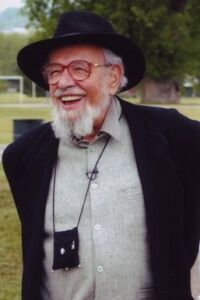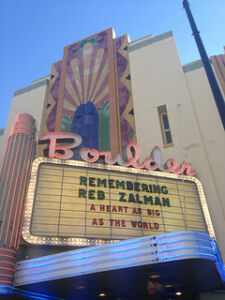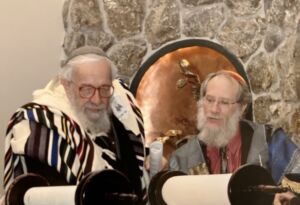Reb Zalman’s Commitment to Inclusiveness and “Deep Ecumenism”

Reb Zalman’s commitment to inclusion for all was born out of personal experience and a knowledge of Jewish history. As a young person in Nazi occupied Europe, he experienced the ultimate exclusion as he and his family sailed in a boat with other Jews looking for a country that would welcome them.
Reb Zalman was always a seeker, and while still a young student in the 1940’s, he came to realize that the spiritual issues he was wrestling with were shared by people of other faiths. The books he read led to engagement with spiritual leaders of many traditions. He concluded that particularism and parochialism inhibited spiritual growth and understanding of the ‘other’.
wrestling with were shared by people of other faiths. The books he read led to engagement with spiritual leaders of many traditions. He concluded that particularism and parochialism inhibited spiritual growth and understanding of the ‘other’.
Once he began to engage academically with religion, Reb Zalman quickly discovered that adherence to one discipline limited one’s understanding of the greater world and its wisdom.
A lifetime of study and engagement was fully articulated in 1998 with his five-day teaching on Deep Ecumenism, presented to over 80 of his students and colleagues. He borrowed this term from his friend, Rev. Matthew Fox whose definition of Deep Ecumenism began with Meister Eckhart’s assertion that ‘divinity is an underground river’. Fox went on to add, there are many wells into that river: a Buddhist well, Christian well, pagan well, Jewish well, etc. and “we would make a grave mistake if we confused the well itself with the flowing waters of the underground river. Many wells, one river. That is Deep Ecumenism.” From this definition, Reb Zalman enunciated his first principle of Deep Ecumenism, namely “you can’t get all your vitamins from one source.”
Reb Zalman demanded the end of particularism and triumphalism. He rejected the traditional engagement with theological disputes and developed a curiosity of how the other “got it on” with the Divine.
In the early 2000s Rabbi Shaya Isenberg (OBM) and I began to teach Deep Ecumenism to seminary students in the Jewish Renewal Seminary inspired by Reb Zalman. Our students were sent out to dialogue with people of various faith traditions; to include them in their study, social action, and prayer.
When Reb Shaya, Bahira Sugarman, Lynne Iser, Rabbi Nadya Gross, and I taught Spiritual Eldering it was from a Deeply Ecumenical perspective. Reb Zalman first introduced spiritual eldering in inclusive settings; he said that elders had more in common with other elders across the spectrum of faith and culture than with younger people in their own communities. This Sage-ing® work was and is for all. Our sources for the work of becoming sages are taken from the humanities and science as well as the insights of a range of spiritual traditions and cultures. Our rituals and ceremonies are infused with contributions of various religious traditions.
What is at stake if we don’t go down the path of Deep Ecumenism? In the words of Rabbi Shaya Isenberg:
“No matter how the reality maps changed, from the Biblical versions of the maps of the Ancient Near East, to the Greco-Roman maps, to the “medieval synthesis” as Judaism shared their reality map with Christians and Muslims, we took for granted, as did all the others, that  only one ‘truth’ about God and the universe could be right. We were all ‘triumphalists.’ In the end, ‘Daddy’ loves us best—and always did. (We didn’t even talk about ‘Mommy’!) This ancient and still current approach focuses us on our differences, the uniqueness of our religious traditions. Truth becomes a competitive commodity. There were boundaries being protected: we didn’t eat their food or celebrate their holy days and we didn’t date each other. It was all about boundaries.”
only one ‘truth’ about God and the universe could be right. We were all ‘triumphalists.’ In the end, ‘Daddy’ loves us best—and always did. (We didn’t even talk about ‘Mommy’!) This ancient and still current approach focuses us on our differences, the uniqueness of our religious traditions. Truth becomes a competitive commodity. There were boundaries being protected: we didn’t eat their food or celebrate their holy days and we didn’t date each other. It was all about boundaries.”
Boundaries are barriers to inclusion. Boundaries are fences that keep ‘the other’ from intruding on our claimed territory. Boundaries are a false sense of security.
“When it comes to our dogmas, myths and theologies – our ‘revelations’ that divide us – we’re all on shaky ground”, says Reb Zalman. “Are we triumphalists … Are we ‘protectionists’, guarding our own borders, protecting our revelations? Or are we ‘good citizens’, glorying in the various ways that people are spiritual and really not taking any of them, especially our own, particularly seriously?” Our beloved teacher saw this world as a living body – Gaia – and all the religions and cultures as organs in the body. In our bodies, we need all the organs to function well, each with their own role and responsibility. If one fails, the others will be weakened and ultimately fail too. So too with the ‘organs’ of Gaia; each has its unique and essential role to play, and we must do our part while supporting the health of all the other parts. In the end, we all must learn to function together as parts of a whole.
For many of us, this teaching of Reb Zalman’s was the springboard to engage in the explicit action directives that flowed from this wisdom. In different ways across this country, in Canada, Israel and in Europe, engagements with Christians and Muslims, Buddhists, Hindus, Sufis and more are taking place. The programs are varied and the bedrock from which these efforts flow is Reb Zalman’s vision.
With that vision in mind, Rabbi Nadya Gross and I, and our congregation, Pardes Levavot, in Boulder, Colorado formed a faith partnership in 2003 with Shepherd of the Hills Lutheran Church. Together with the pastors, Linda and Larry Daniels-Block, we began to actively explore how our two congregations could engage in Deep Ecumenism. We focused on the teachings of Reb Zalman, who made himself available as a mentor and participant in our efforts. We learned to pray together without dilution. We studied texts together and learned more about one another’s world-view as we interpreted those texts. When the two pastors left to serve another congregation, the church leaders informed us that they wouldn’t hire a pastor who didn’t embrace Deep Ecumenism, as this work had become an integral part of their identity. Over the 20 years, as we’ve shared the building, prayed, learned and engaged in humanitarian projects together, true friendships have developed between synagogue and church members; and each have found their own faith strengthened and renewed through this relationship. With the recent increase of anti-semitism, the church members have been steadfast in the denunciation of that expression of hatred. This relationship gives us hope the boundaries can come down, and together we can repair old patterns of separation, making this world safer for all.
partnership in 2003 with Shepherd of the Hills Lutheran Church. Together with the pastors, Linda and Larry Daniels-Block, we began to actively explore how our two congregations could engage in Deep Ecumenism. We focused on the teachings of Reb Zalman, who made himself available as a mentor and participant in our efforts. We learned to pray together without dilution. We studied texts together and learned more about one another’s world-view as we interpreted those texts. When the two pastors left to serve another congregation, the church leaders informed us that they wouldn’t hire a pastor who didn’t embrace Deep Ecumenism, as this work had become an integral part of their identity. Over the 20 years, as we’ve shared the building, prayed, learned and engaged in humanitarian projects together, true friendships have developed between synagogue and church members; and each have found their own faith strengthened and renewed through this relationship. With the recent increase of anti-semitism, the church members have been steadfast in the denunciation of that expression of hatred. This relationship gives us hope the boundaries can come down, and together we can repair old patterns of separation, making this world safer for all.
Reb Zalman’s inspiration is at the heart of our organization, Yerusha (Hebrew: legacy). Yerusha is the home of the Sage-ing® Legacy Program, which trains Sage-ing® Mentors and soon will add a mastery level training. Like Sage-ing® International, we spring from Reb Zalman’s teachings with the addition of the unique imprint of Reb Shaya and Bahira. It is also the home of the Institute for Deep Ecumenism which will soon launch a Certificate in Deep Ecumenism Chaplaincy. All of which is an expression of Reb Zalman’s favorite reminder to us all:
“The only way to get it together is … together.”
Author Biography
Rabbi Victor Gross is a congregational Rabbi and Educator. He served as faculty and Director of Studies in the Aleph Rabbinical Program, where he taught Reb Zalman’s writings and Deep Ecumenism. He co-founded the Sage-ing® Legacy Program, a program of Yerusha, and taught with Rabbi Shaya Isenberg, Bahira Sugarman, Lynne Iser and Rabbi Nadya Gross. Presently, R’ Victor serves on the faculty of the Anamcara Project of the Sacred Art of Living Center in Bend, OR., and is founding faculty for the Institute for Deep Ecumenism of the Yerusha Academy. Reb Victor is the author of Educating for Reverence: The Legacy of Abraham Joshua Heschel.
Join over 4,000 Members Enjoying Sage-ing International
Subscribe Here


